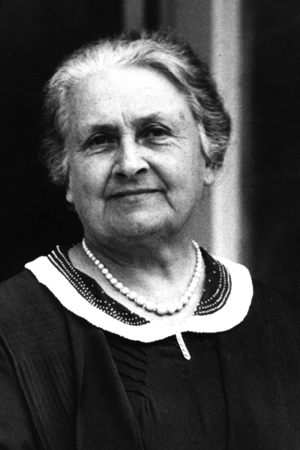About Dr. Maria Montessori
 Dr. Maria Montessori was born in Italy in 1870, when women had limited choices for careers. She was a Renaissance woman who rose above expectations and became a physician. After receiving her medical degree in 1896, she practised medicine for women and children and lectured at the University of Rome. Her research on child development and the "nervous diseases" in children was published in several prestigious technical journals. Dr. Maria Montessori became known as a brilliant speaker, and through the years, she spoke at many international assemblies, renouncing child labour and mistreatment of women.
Dr. Maria Montessori was born in Italy in 1870, when women had limited choices for careers. She was a Renaissance woman who rose above expectations and became a physician. After receiving her medical degree in 1896, she practised medicine for women and children and lectured at the University of Rome. Her research on child development and the "nervous diseases" in children was published in several prestigious technical journals. Dr. Maria Montessori became known as a brilliant speaker, and through the years, she spoke at many international assemblies, renouncing child labour and mistreatment of women.
Her work with "unfortunate children" at the Psychiatric Clinic at the University of Rome inspired her to register at the University to study education, philosophy, psychology and anthropology. When asked to establish an early childhood centre in San Lorenzo, Dr. Maria Montessori set to work to create a unique environment for children on a very limited budget. She commissioned a carpenter to make tables, chairs and learning materials to her precise specifications - small enough and light enough for children to move on their own. Through observation of her first 60 students, mostly undisciplined and abandoned, she discovered timeless and universal truths about young children. Within this prepared environment, she found children responded astoundingly when given freedom to make choices, when consistent guidelines were provided. Children spontaneously chose activities appropriate to their interests, abilities and needs.
Dr. Maria's Twelve Guiding Principles of a Montessori Teacher
A Dodecalogue (Compiled from A. Paulini's lectures, Centro Internazionale Montessori Perugia)
- Take meticulous and constant care of the environment.
- Show the child where everything belongs; show clearly and precisely the use of the material and stop firmly any misuse with mild words and loving presence.
- Be active when you put the child in constructive relationship with the environment; be seemingly passive when the contact is established.
- Observe the children constantly in order to notice the one who needs support.
- Be ever ready to answer the call of a child who needs your help.
- Listen and respond when asked to.
- Respect the one who works without interrupting him or questioning him.
- Respect the one who makes mistakes by not correcting him directly. As soon as he can, allow him to discover his mistake and correct it by himself.
- Respect the one who is resting or who is observing the ones who are working or who is pondering over what he himself has done or will do; don’t disturb him and don’t force him to other forms of activity.
- Be untiring in repeating presentations to the one who has refused them earlier, to the one who has not yet learned how to do it and to the one who has not yet overcome imperfections.
- Make your ready presence felt to the one who is searching and be invisible to the one who has found.
- Reveal the best of yourself to the one who has completed his work through his own effort; give him silently and “spiritually” your approval.